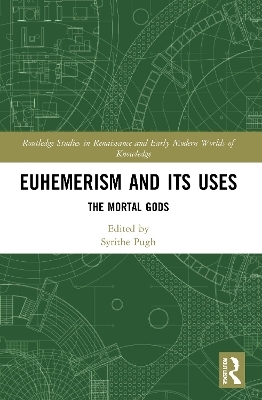
Euhemerism and Its Uses
Routledge (Verlag)
978-0-367-55701-0 (ISBN)
Euhemerism and Its Uses offers the first interdisciplinary, focussed, and all-round view of the long history of an important but understudied phenomenon in European intellectual and cultural history.
Euhemerism – the claim that the Greek gods were historically mortal men and women – originated in the early third century BCE, in an enigmatic and now fragmentary text by the otherwise unknown author Euhemeros. This work, the Sacred Inscription, has been read variously as a theory of religion, an atheist’s manifesto, as justifying or satirizing ruler-worship, as a fantasy travel-narrative, and as an early ‘utopia’. Influencing Hellenistic and Roman literature and religious and political thought, and appropriated by early Christians to debunk polytheism while simultaneously justifying the continued study of classical literature, euhemerism was widespread in the middle ages and Renaissance, and its reverberations continue to be felt in modern myth-theory. Yet, though frequently invoked as a powerful and pervasive tradition across several disciplines, it is still under-examined and poorly understood.
Filling an important gap in the history of ideas, this volume will appeal to scholars and students of classical reception, mediaeval and Renaissance literature, historiography, and theories of myth and religion.
Syrithe Pugh is Reader in the School of Language, Literature, Music and Visual Culture at the University of Aberdeen. Her research focusses on the reception of classical literature during the Renaissance period.
Introduction 1. Gods in space and time: Callimachus and Euhemerus 2. Euhemerism in Virgil’s Aeneid and Ovid’s Metamorphoses 3. Lactantius’ Euhemerism and its reception 4. Grounding the gods: spreading geographical euhemerism from Servius to Boccaccio 5. Mythography as ethnography. Euhemerism in Giovanni Boccaccio’s explications of Mercury in the Genealogie Deorum Gentilium Libri 6. Tracking Titan from Boccaccio to Milton: euhemerism and Tyrannomachy in the Renaissance 7. ‘Canonized bones’: Shakespeare, Donne, and the euhemeristic aesthetic in early modern England 8. Totus adest oculis? Approaching euhemerism in Ben Jonson, His Part of King James His Royal and Magnificent Entertainment, 1604 9. ‘The sins of Euemeros against truth and honesty’: Indo-European Comparative Mythology versus Euhemerism in Victorian Britain 10. Frazer as euhemerist: the case of Osiris 11. Between reception and deception: the perennial problem with euhemerism Appendix: the Euhemerus testimonia (edited and translated by C. L. Caspers)
| Erscheinungsdatum | 22.12.2022 |
|---|---|
| Reihe/Serie | Routledge Studies in Renaissance and Early Modern Worlds of Knowledge |
| Zusatzinfo | 1 Halftones, black and white; 1 Illustrations, black and white |
| Verlagsort | London |
| Sprache | englisch |
| Maße | 156 x 234 mm |
| Gewicht | 453 g |
| Themenwelt | Geschichte ► Allgemeine Geschichte ► Neuzeit (bis 1918) |
| Geschichte ► Teilgebiete der Geschichte ► Kulturgeschichte | |
| Geisteswissenschaften ► Sprach- / Literaturwissenschaft ► Anglistik / Amerikanistik | |
| Geisteswissenschaften ► Sprach- / Literaturwissenschaft ► Literaturwissenschaft | |
| ISBN-10 | 0-367-55701-0 / 0367557010 |
| ISBN-13 | 978-0-367-55701-0 / 9780367557010 |
| Zustand | Neuware |
| Haben Sie eine Frage zum Produkt? |
aus dem Bereich


